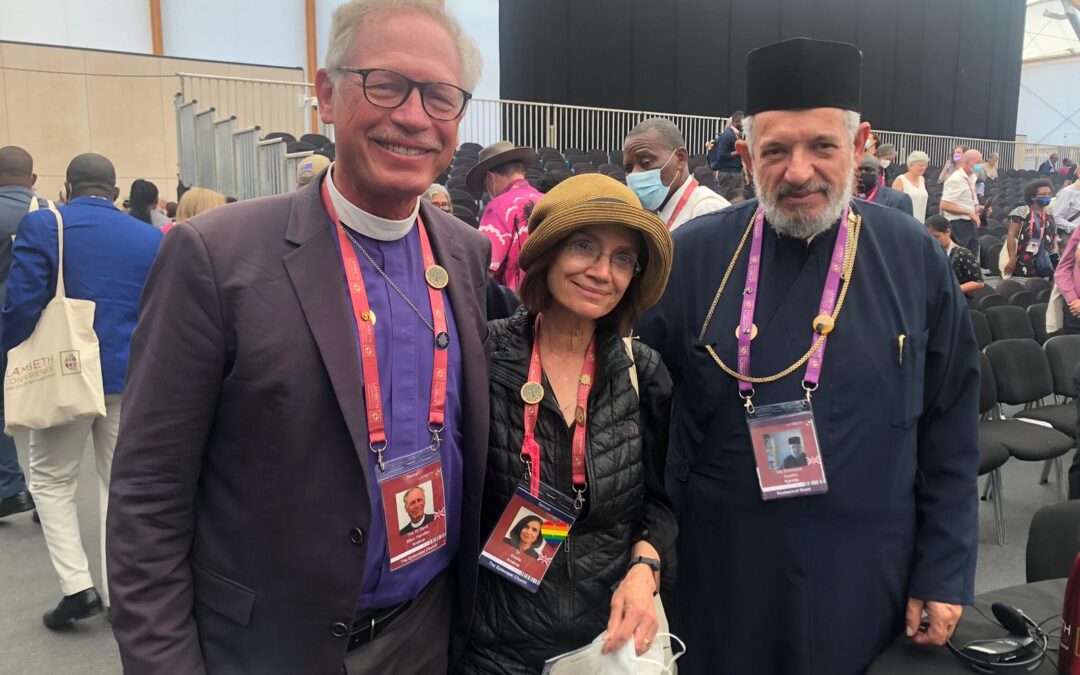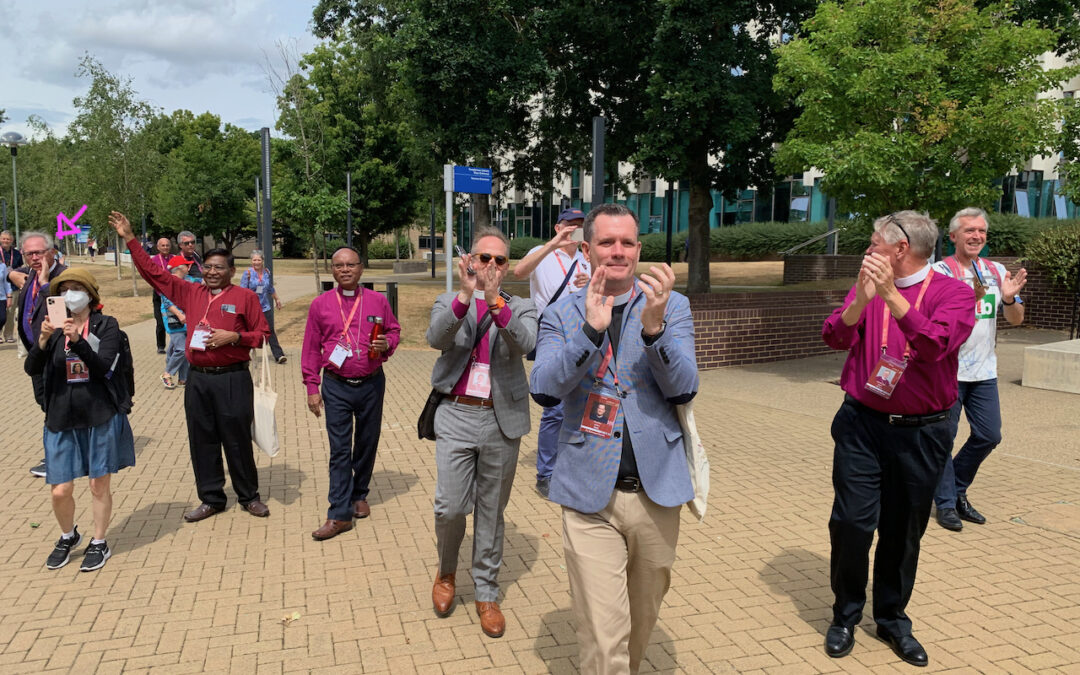| Anuncio a la Diócesis Episcopal de California
Hemos llegado hasta aquí por fe,
apoyándonos en el Señor,
confiando en su santa palabra,
hasta ahora, nunca nos ha fallado.
Cantando, oh, oh, oh, no puedo regresar,
Hemos llegado hasta aquí por la fe.
Saludos a mis hermanos de la Diócesis Episcopal de California en un día en que recordamos la celebración de María Magdalena, y el aniversario de mi nombramiento como su obispo en 2006, para anunciarles los planes de mi retiro como su obispo. Comparto esta noticia con el corazón pleno, lleno de agradecimiento por el tiempo que Sheila, nuestros hijos y yo hemos vivido con ustedes en este extraordinario lugar de posibilidades. Tras mi elección, ofrecí una declaración que era también una oración y una esperanza de lo que podríamos hacer juntos; a continuación, un extracto de esa declaración:
“…su voto hoy sigue siendo un voto por la inclusión y la comunión: de personas gays y lesbianas en su plenitud de vida, tanto solteros/as como en pareja, de mujeres, de todos. Minorías étnicas, y todas las personas. Mi compromiso con la propia misión de inclusión de Jesucristo es firme.
Y comparto con ustedes su compromiso, fuertemente expresado, con los jóvenes, con los que aún no conocen a Cristo, con nuestra vocación de evangelizadores y por la creación expectante de Dios.
Considero que esta elección es una expresión de nuestro deseo común de formar parte del conjunto, de la comunión, y del mundo, en lo que puede ser una nueva manera. Trabajaremos juntos en el proceso de escucha, prestando la voz única de los episcopales del Área de la Bahía a esta gran conversación y trabajando para acabar con el sufrimiento humano global.
Por último, permítanme decir que, al nutrirme como obispo de la Diócesis Episcopal de Alabama, al nutrirme del testimonio histórico y vivo de tantos héroes de la lucha por los derechos humanos, cuyas palabras y hechos de compasión y justicia me han inspirado y sostenido, les expreso el sentimiento de un héroe de la costa oeste, …en la causa de la paz, no podemos ser velocistas, debemos ser corredores de largas distancias”. (Cesar Chavez)
Con humildad, y por la gracia de Dios, creo que hemos trabajado juntos en todas estas expectativas, por lo que hay mucho que celebrar. En los primeros años de mi episcopado, pusimos en marcha un proceso de planificación estratégica que ha sido fundamental para la construcción de nuestra querida comunidad: revisamos nuestra gobernanza diocesana para lograr una mayor transparencia entre los órganos de dirección, y buscamos y desarrollamos activamente recursos para apoyar la diversidad, el compromiso con nuestras comunidades y la invitación a nuestras congregaciones. Inmediatamente, iniciamos la transición de las comunicaciones en papel a las digitales y hoy nos beneficiamos de un dinámico boletín electrónico semanal y de comunicaciones en redes sociales dirigidas por un personal diocesano excepcional.
Nuestro trabajo conjunto produjo logros materiales y programáticos que siguen teniendo impacto en el Área de la Bahía y en la Comunión Anglicana –
- un esfuerzo de $2.300 millones, que reconstruyó el Hospital de St. Luke y un nuevo hospital de cuidados cuaternarios en Av. Van Ness, como resultado de nuestra participación en un proceso de planificación en toda la ciudad;
- una exitosa campaña de recaudación que aporta $14 millones en nuevos recursos a la diócesis; el desarrollo de Episcopal Charities al Fondo de Impacto Episcopal, con un millón de dólares en nuevos fondos para los programas del Área de la Bahía;
- el liderazgo en nombre de la Iglesia Episcopal para trabajar en la lucha contra la crisis climática, incluido el estatus de observador oficial en las conversaciones sobre el cambio climático de las Naciones Unidas;
- el apoyo a la educación en la Diócesis Episcopal de Haití, que se traduce en la plantación de 160.000 árboles y la educación musical de jóvenes haitianos vulnerables;
- co-anfitrión de una conferencia climática con nuestra diócesis hermana en Brasil que aportó nuevas enseñanzas en el plenario de Obispos;
- trabajo creativo en la liturgia, como la Eco-confirmación;
- el desarrollo de nuestra escuela para diáconos hacia un programa en línea que llevará las oportunidades educativas para el diaconado a través de los Estados Unidos;
- ministerio fundamental y la defensa de la igualdad conyugal en la Iglesia Episcopal y en los Estados Unidos;
- participación en instituciones y congregaciones diocesanas que apoyan el patrimonio y los derechos de los latinos/latinas, la población negra y asiáticos; y
- el lanzamiento de la visión de St Anna-Jubilee Farm, entre otras muchas necesidades importantes en materia de justicia.
Más recientemente, hemos encontrado nuevas formas de ser una iglesia compasiva y vibrante en el Área de la Bahía durante la pandemia de COVID, utilizando nuevas tecnologías y recursos que puedan sostener al ministerio. Estoy agradecido de que, gracias a las generosas donaciones de varios episcopales, hayamos podido ofrecer ayuda financiera a más de 40 congregaciones durante los dos primeros años de la pandemia, y un sustento durante el mismo tiempo a nuestros campamentos y centros de conferencias de St Dorothy y Bishop’s Ranch. También nos beneficiamos durante este tiempo extraordinario de un equipo diocesano de respuesta ante crisis con miembros de nuestro personal diocesano, nuestro Canciller y personas clave del clero y del laicado, que se unieron a mí para asesorar y proporcionar recursos a través de una serie de necesidades, desde la interpretación de las normas estatales, locales y federales relativas al COVID, hasta las solicitudes para el Programa de Protección del Salario (PPP, por sus siglas en inglés), así como los préstamos destinados a la tecnología para servicios híbridos y recursos para la liturgia y la formación cristiana.
También nos hemos enfrentado a desafíos, decepciones y tristezas: la pérdida de queridos amigos que se entregaron sin reservas a los ministerios de nuestra diócesis, el cierre de algunas de nuestras congregaciones y los desafíos propios del Área de la Bahía y de nuestro mundo en el siglo XXI, que van desde los incendios forestales y la desigualdad de ingresos hasta la atomización de la comunidad. El espiritual que cité al principio de esta carta continúa:
No te desanimes
cuando los problemas se presenten en tu camino.
Él llevará todas tus cargas,
y convertirá toda tu noche en día.
Todos estos éxitos y decepciones los hemos afrontado juntos en un modelo de vida común, bendecido por las visitas, confirmaciones, ordenaciones y el trabajo con las instituciones diocesanas y los colaboradores locales y regionales. Quiero reconocer especialmente el trabajo fiel, dedicado y excelente del personal diocesano, pasado y presente. Estas maravillosas personas sirven fielmente y en oración cada día. Y, hermanos míos, ¡hay más ministerio ante nosotros!
Su destacado Comité Permanente, dirigido por la Rev. Dra. Deborah White, Presidenta, dirigirá, independientemente de mí y del personal diocesano, un proceso de búsqueda del 9º Obispo de la Diócesis Episcopal de California. En resumen, convocarán un comité de búsqueda con el objetivo de elegir a su próximo obispo el 9 de diciembre de 2023 El proceso de consentimiento del obispo electo durará varios meses, y la fecha prevista para la consagración es el 4 de mayo de 2024. Habrá una breve transición de unos tres meses en la que su próximo obispo ejercerá de coadjutor, y Sheila y yo partiremos hacia nuestro nuevo hogar y vida en Virginia a finales de julio de 2024.
Este cronograma, que sigue el cronograma normal y el proceso ordenado para la elección y transición de un obispo en la Iglesia Episcopal, me da tiempo no solo para continuar en el ministerio como su obispo por un tiempo más, sino también para trabajar con ustedes en una serie de objetivos importantes, por ejemplo, la plena implementación de nuestra Iniciativa Vital y Próspera (Vital and Thriving Initiative) de DioCal, que traerá fondos para el nuevo ministerio y empoderará a las congregaciones para llevar a cabo dicho ministerio; el llamamiento de un canónigo para la justicia racial, medioambiental y social; la continuación de mis esfuerzos para apoyar a las congregaciones frágiles de DioCal; y, el trabajo con socios dentro y fuera de la Iglesia Episcopal para abordar la crisis climática, incluyendo la dirección de las delegaciones de la Iglesia Episcopal en la ONU. Conferencia sobre el Cambio Climático en nombre de nuestro Obispo Presidente.
Con estos y otros objetivos, pueden ver que todavía hay mucho que hacer juntos, pero también espero con ansias su próximo capítulo, cuando seguramente serán bendecidos por un nuevo obispo. De esto estoy seguro: la Diócesis Episcopal de California es, y seguirá siendo, un lugar de posibilidades. Es un lugar de gracia y belleza en Dios, y ha sido el profundo honor de mi vida compartir el ministerio con ustedes.
Hemos llegado hasta aquí por la fe,
Apoyándonos en el Señor…
Volviendo a lo espiritual que ha modelado esta carta, puedo ver el alcance del ministerio de Jesús, que proporciona la forma de nuestro propio ministerio compartido, cómo aquel en quien nos apoyamos estuvo siempre acompañado por el Espíritu y contando con él. El Espíritu que se posó sobre Él en su bautismo. El Espíritu que inmediatamente lo condujo o llevó al desierto para ser probado. El Espíritu que entonces brotó de Él, mientras recorría Galilea, anunciando su acercamiento a la amada comunidad. Creo que juntos hemos procurado conformar nuestra vida según ese modelo, confiando siempre en el Espíritu Santo, siempre presente, dando testimonio a la querida comunidad. Siento confianza en que continuarán en este camino sagrado del Espíritu, que avanzarán con fe, sosteniéndose en Dios.
Para terminar, sepan que cuando llegue el momento de que Sheila y yo nos vayamos, nos llevaremos con nosotros el sonido de la sirena de niebla, las puestas de sol en el Bishop’s Ranch, el misterio de los bosques en St. Dorothy y las vistas de la Bahía de Tomales en St Columba, Inverness, la calidez y el amor de las congregaciones de toda la zona de la bahía, el dulce sonido de los coros de niños, de los campistas y de los jóvenes adultos en los eventos del ministerio del campus, el espacio sagrado de Grace Cathedral, y los lazos del corazón de la amistad de todos ustedes. Ustedes, la Diócesis de California, siempre serán parte de nosotros, amada comunidad que han sido nuestra bendición.
Estoy agradecido por el llamado que me dieron para servir como su obispo, y siempre tendré a la gran Diócesis de California, y a su gente, en mi corazón y en mis oraciones.

|





